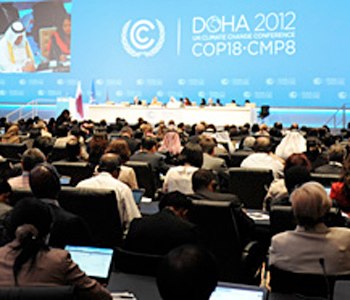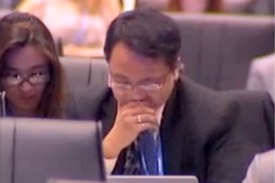 John M. Broder, New York Times
John M. Broder, New York Times
DOHA, Qatar — The annual United Nations climate change negotiations concluded here late Saturday after the customary all-night negotiating session and recriminations over who must bear the costs and burdens of a warming planet.
Delegates from more than 190 nations agreed to extend the increasingly ineffective Kyoto Protocol a few years and to commit to more ambitious — but unspecified — actions to reduce emissions of climate-altering gases.
Wealthy nations put off for a year resolution of the dispute over providing billions of dollars in aid to countries most heavily affected by climate change. Industrial nations have pledged to secure $100 billion a year by 2020 in public and private financing to help poor countries cope with climate change, but have been vague about what they plan to do before then.
Only a handful of countries, not including the United States, have made concrete financial pledges for adaptation aid over the next few years. Todd D. Stern, the senior American negotiator, said that the United States would continue to provide substantial climate-related aid to vulnerable countries. But he said he was not in a position, given the budget talks in Washington and the Congressional process, to promise new American financing.

(The Guardian-UK)
The participants noted with “grave concern” the widening gap between what countries have promised to do to reduce emissions and the growing concentration of greenhouse gases in the atmosphere. They declared it unlikely that on the current path the world would be able to keep global temperatures from rising more than two degrees Celsius (3.6 degrees Fahrenheit) from pre-industrial times, a central goal of the United Nations process.
But the group left for future years any plan for addressing the mismatch between goals and reality, merely stating an intention to “identify and explore in 2013 options for a range of actions to close the pre-2020 ambition gap.” The accomplishments of this year’s meeting of the United Nations Framework Convention on Climate Change were modest, but so were its aims.
The meeting, formally known as the 18th Conference of the Parties, or COP 18, was always seen as a transition from the longstanding division of nations into industrialized perpetrators and developing-world victims of dangerous climate change. That division was enshrined in the Kyoto Protocol, which the United States never joined and which assigned pollution reduction targets to advanced nations but none to developing countries, including the world’s current largest greenhouse gas emitter, China.
The parties agreed last year in Durban, South Africa, to work toward a new protocol or other legally binding instrument that would require actions of all parties, not just rich nations as under the Kyoto agreement of 1997. The new agreement is to be concluded by 2015 and enter into force in 2020.
The Doha meeting did not produce even the barest outline of what that new agreement would look like, leaving those questions for future meetings. (Read more at the New York Times)
FURTHER COVERAGE:
- Despair After Climate Conference, But UN Still Offers Hope (Reuter/AlertNet)
- At Doha Climate Talks, Modest Results At Best (NPR)
- World Bank Issues Alarming Climate Report (NPR)
- UN Envoys in Final Push for Climate Deal as Deadline Looms (Bloomberg)
- Will Philippines Negotiator’s Tears Change Course on Climate Change? (The Guardian-UK)
LOCAL AREA HEADLINES:
- Is drought coming back in Houston? (KPRC 2 News)
- Company behind Rick Perry’s controversial stem cell treatment dukes it out with lab partners (Houston Culture Map)
- Dog that bit student on bus to be euthanized (KPRC 2 News)
- Foster kid’s fight caught on camera (KPRC 2 News)
- Alvin teacher wins prestigious award (KTRK 13 News)
- Goodfellows: Mother’s slow death wrenches family during holidays (Chron.com)
- MD Anderson Strikes Deal With Drug Company With Up To $335 million (KUHF Public Radio)
- Local Neurologist Says No-Kickoff Idea Might Be a Good One (KUHF Public Radio)
STATE, NATION & WORLD:
- Water percolates up Texas Legislature’s agenda (Chron.com)
- Straus promises $2B in extra public-school funding (AP)
- Cancer agency chair wants missing emails found (Chron.com)
- More DPS workers testing blood to ease backlog (AP)
- Supreme Court to decide same-sex marriage (AP)
- Proposed Rules on Fracking Gain Cautious Praise (New York Times)
- New Taxes to Take Effect to Fund Health Care Law (New York Times)
- ‘It’s A Disaster’: Life Inside A Syrian Refugee Camp (KUHF Public Radio)
